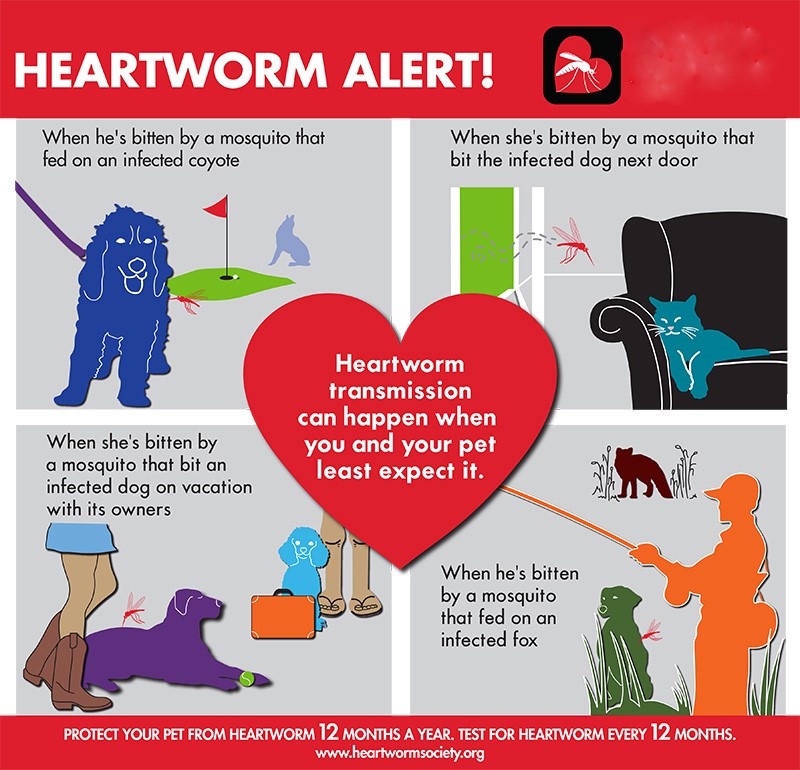What is Heartworm Disease?
Heartworm Disease is caused by an internal parasite that can grow up to lengths of 1 foot and lives primarily in the heart, lungs, and associated blood vessels. The adult worms live in the heart and cause severe and permanent damage to the tissues and can be fatal.

How is Heartworm Disease transmitted?
Heartworms release larvae (microfilaria) into the bloodstream of infected dogs. The microfilaria are then picked up by mosquitos feeding off of infected dogs and then transmit the microfilaria to other dogs. It only takes one bite from the mosquito for your dog to become infected. Dogs are not the only animals that can become infected however; foxes, coyotes, wolves, cats, ferrets, and even humans have been found to have Heartworm Disease. Since wildlife is never treated for Heartworm Disease they are a large reservoir for mosquitos to pick up heartworms and transmit to our companion animals.
What dogs are susceptible?
No dog is immune to Heartworm Disease! Indoor and outdoor dogs are equally at risk because Heartworm Disease is transmitted by mosquitos. Heartworm Disease has been diagnosed in all 50 states. Some states have a larger endemic problem than others, but the vast number of dogs that travel all around the country with their owners, and the number of dogs that are adopted in one state and moved to another, no state should be considered “safer” than another! Puppies that are less than 6 months old cannot be considered positive for heartworms because the lifecycle of a heartworm to become mature is 6 months. This is why puppies 6 months or younger are started on a Heartworm Preventative without testing first.
How do I know if my dog has heartworms?
By the time Heartworm Disease causes symptoms in your dog such as coughing, exercise intolerance, and difficulty breathing, severe and permanent heart damage has already occurred. The only way to know for sure is to have your dog tested for heartworms.
What can I do about heartworms?
We abide by the guidelines set by the American Heartworm Society, which are to test your dog for heartworms once yearly in the spring time and then give Heartworm Prevention once monthly for the entire year. Prevention is best when it comes to Heartworm Disease because treating a dog that has heartworms is very difficult, expensive, and dangerous to the pet. Giving your pet monthly Heartworm Prevention is safe and effective.
What are intestinal parasites?
Intestinal parasites in dogs consist of many different species of worms that can live in the internal organ of animals for a long time without showing any symptoms of infection. The adults shed eggs that the dog passes into its feces, and then infects other dogs that come in contact with the eggs. Some species of internal are also transmittable to humans which can cause dangerous symptoms. Children, the elderly, and immunocompromised patients are especially at risk for these zoonotic (meaning transmittable to people from animals) parasites.
What can happen if humans get intestinal parasites?
People are not the normal host for canine intestinal parasites. When a person becomes infected, the intestinal parasite does not necessarily stay in the intestinal tract. Roundworms will migrate throughout the body and can end up anywhere, including the eye, which can cause blindness. Hookworms can burrow through the skin of your foot, causing painful and itchy pathways under the skin.
How does my dog get intestinal parasites?
Dogs can pick up intestinal parasites in a variety of ways: grooming their feet after a walk in the park and coming into contact with parasite eggs, eating fleas while grooming, feeding on the carcass they have found on the prairie, or even licking the bottom of your shoes or pants after you have walked through an infected area. The infective stages of a parasite a dog ingests are not visible to the naked eye.
Why is deworming important?
There are many reasons why deworming your pet is important-the biggest reason is because intestinal parasites are gross!! Intestinal problems are a big zoonotic problem especially for young children who are known to put anything in their mouths! The elderly and immunocompromised are also extremely susceptible to an infection from a dog or cat parasite. Animals can also become very sick from a large parasitic presence. Symptoms include anemia, poor absorption of nutrients (leading to malnutrition), poor hair coat, vomiting and diarrhea. Parasite eggs can remain in the environment dormant for a very long time, so by deworming we can prevent new adults from spreading more eggs to the environment.
What products are available for deworming?
There are many products available to deworm you pet ranging from a deworming tablet given at your pets routine visit, to a monthly preventative tablet that helps prevent Heartworm Disease. The best treatment of intestinal parasites and heartworms is actually prevention.
